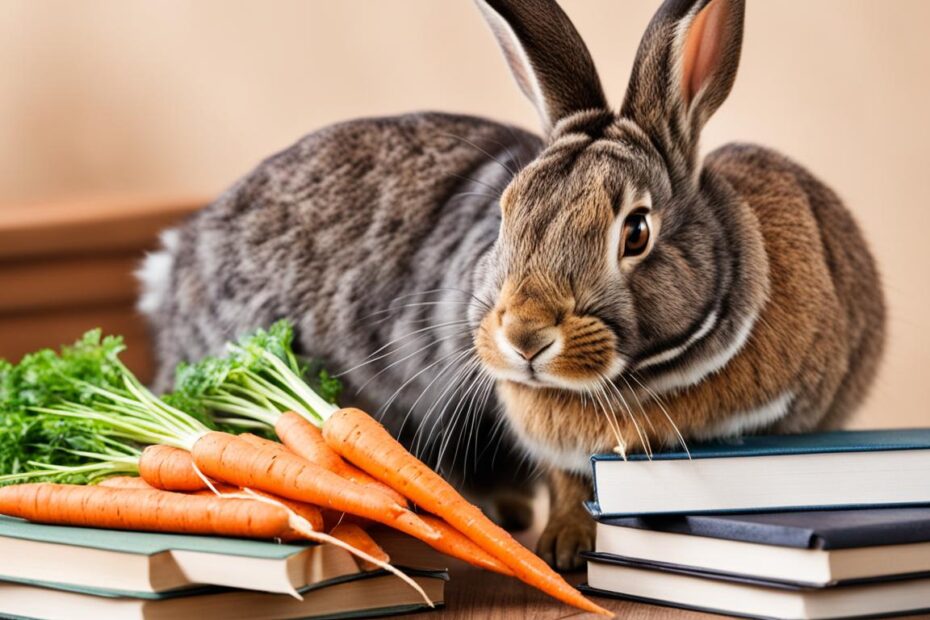Carrots are often thought of as a healthy treat for rabbits, but is that really the case? In this article, we will explore the common myth surrounding carrots and rabbits, and uncover the truth about their impact on rabbit health. Understanding the facts is crucial for the safety and well-being of our furry friends.
Many people believe that carrots are a staple food for rabbits, but the reality is quite different. While rabbits may enjoy the taste of carrots, they should not be a significant part of their diet. High in sugar, carrots can lead to various health issues for rabbits, including tooth decay and digestive problems.
It is important to prioritize rabbit food safety and be aware of the potential risks associated with certain foods. Let’s delve into the facts and dispel the myth surrounding carrots and rabbits for good.
Key Takeaways:
- Carrots are not dangerous for rabbits, but they should not be a staple in their diet.
- Feeding rabbits too many carrots can lead to tooth decay and other health issues.
- Rabbits have specific dietary needs, and their diet should primarily consist of high-fiber foods.
- Carrots can be given as occasional treats, but they should not replace essential rabbit nutrition.
- Striking a balance between variety and moderation is crucial for a rabbit’s overall health and well-being.
The Myth of Rabbits and Carrots
When it comes to rabbits, the association with carrots is deeply ingrained in popular culture, thanks to a famous cartoon character named Bugs Bunny. However, the reality is that rabbits in the wild do not naturally have a diet that includes root vegetables like carrots. Their natural diet primarily consists of wild greens such as grasses and clover.
While domesticated rabbits may enjoy the occasional carrot as a treat, it is important to dispel the myth that carrots should be a staple in their diet. Contrary to popular belief, rabbits have specific dietary needs that are best met through a balanced and varied menu.
In the wild, rabbits have evolved to efficiently digest and extract nutrients from the plant materials available to them, which mostly consists of high-fiber foods. These foods help regulate their digestion and maintain overall health. Carrots, on the other hand, are relatively high in sugar content and lack the necessary fiber that wild rabbits need for optimal digestion.
“The association between rabbits and carrots may have come from popular culture, but it is not reflective of a rabbit’s natural diet.”
Feeding rabbits too many carrots can lead to a range of health issues, including obesity, digestive problems, and tooth decay. It is crucial for rabbit owners to understand the nutritional requirements of their furry friends and provide them with a diet that mimics their natural instincts.
Therefore, while rabbits may have a fondness for carrots, it is important to prioritize their overall health and well-being by offering a diet that includes high-fiber foods like hay, leafy greens, and other suitable vegetables. Carrots should only be given as occasional treats, and the majority of their diet should consist of the foods that closely resemble their natural diet in the wild.
The Truth About Carrots for Rabbits
When it comes to rabbit nutrition, it’s important to understand the role of carrots in their diet. While carrots are often seen as a beloved treat for rabbits, they should not be a main component of their daily meals. Let’s take a closer look at rabbit nutrition guidelines, harmful vegetables for rabbits, and the precautions to take with their diet.
Carrots do offer some nutritional benefits for rabbits. They are high in fiber, calcium, and Vitamin A, which are all essential for their overall health. However, it’s crucial to consider the high sugar content in carrots. Feeding rabbits too many carrots can lead to weight gain, digestive issues, and dental problems.
To ensure a balanced diet for rabbits, it’s important to offer a variety of vegetables alongside hay and grass. This will provide them with the necessary nutrients while avoiding potential health risks. While carrots can be given to rabbits as an occasional treat, they should not make up a large portion of their diet.
To help you understand the potential risks and nutritional guidelines for rabbits, here is a table summarizing some harmful vegetables and the precautions to take:
| Harmful Vegetables for Rabbits | Rabbit Diet Precautions |
|---|---|
| 1. Avocado | Should be avoided entirely as it contains a toxin called persin that is harmful to rabbits. |
| 2. Potatoes and potato greens | Contain toxic compounds and should never be fed to rabbits. |
| 3. Rhubarb | The leaves and stems of rhubarb are toxic for rabbits and should be avoided. |
| 4. Tomato leaves and stems | Contain a toxic substance called solanine and should not be given to rabbits. |
Remember, providing a balanced diet for rabbits is essential for their well-being. Focus on introducing a variety of vegetables that are safe for rabbits, and prioritize high-fiber foods like hay and grass. Carrots can still be part of their diet, but in moderation as an occasional treat rather than a staple. By understanding rabbit nutrition guidelines and taking precautions with their diet, you can help ensure that your furry friend stays healthy and happy.
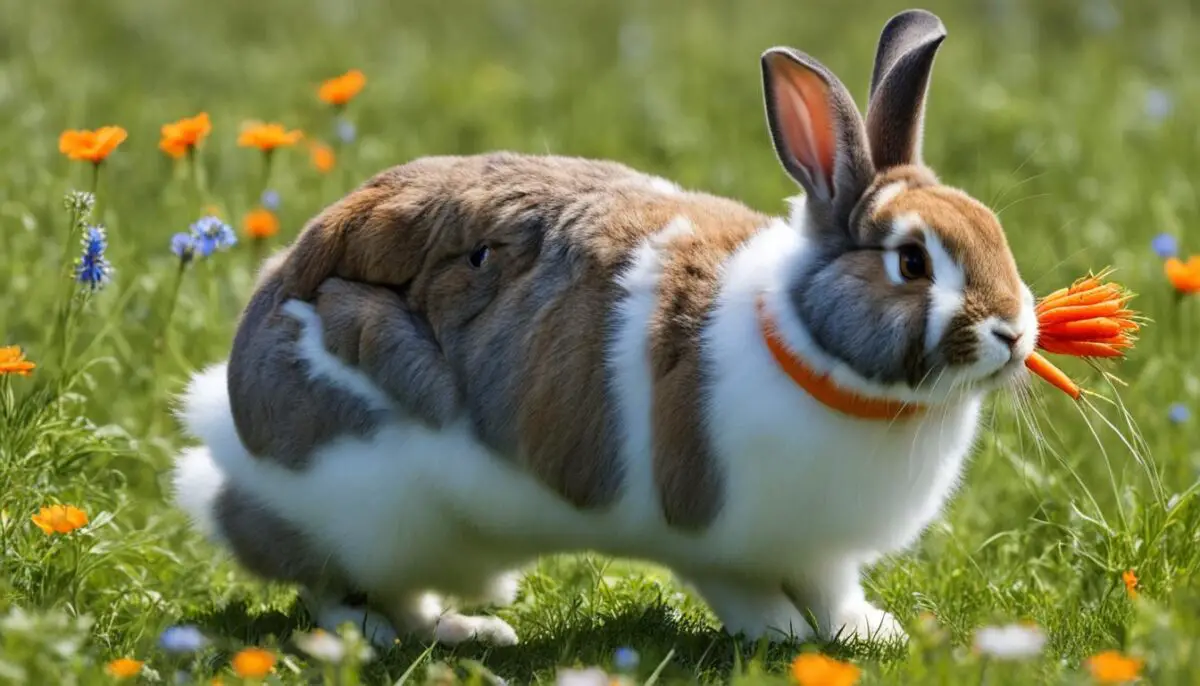
Understanding Rabbit Nutrition
Rabbits are herbivores and have specific nutritional needs that require a well-balanced diet. The foundation of a rabbit’s menu should primarily consist of high-fiber foods, such as hay, grass, and leafy greens. A diet rich in fiber helps maintain proper digestive health and prevents common issues like obesity and dental problems.
While rabbits may enjoy the taste of carrots, it is important to remember that they should be considered a supplementary food rather than a primary source of nutrition. Carrots have a higher sugar content compared to other vegetables, which can lead to weight gain and potential health problems if consumed excessively.
Here is a breakdown of the rabbit’s nutritional needs:
High-Fiber Foods
The foundation of a rabbit’s diet, high-fiber foods are essential for maintaining a healthy digestive system. They promote proper gut motility and prevent issues such as gastrointestinal stasis. Hay, grass, and leafy greens are excellent sources of fiber that should make up the majority of a rabbit’s daily intake.
| Fiber-Rich Foods for Rabbits | Benefits |
|---|---|
| Timothy hay | Supports dental health and provides essential roughage |
| Orchard grass | Rich in fiber and essential nutrients, promotes gut health |
| Brome grass | Provides necessary fiber and contributes to dental wear |
| Romaine lettuce | Low in oxalates and high in water content |
| Kale | Rich in fiber and calcium, but should be fed in moderation due to high oxalate content |
- Hay: The foundation of a rabbit’s diet, hay provides essential fiber and promotes dental health. It should be available at all times.
- Grass: Fresh grass, free from pesticides, can be given to rabbits in controlled amounts as a supplemental source of fiber.
- Leafy greens: A variety of leafy greens such as romaine lettuce, kale, and cilantro can be included in a rabbit’s diet. They provide additional nutrients and help maintain hydration.
By prioritizing high-fiber foods, rabbit owners can provide their furry companions with a diet that supports optimal health. Remember, carrots should be given as occasional treats to supplement a balanced diet and not as a primary source of nutrition.
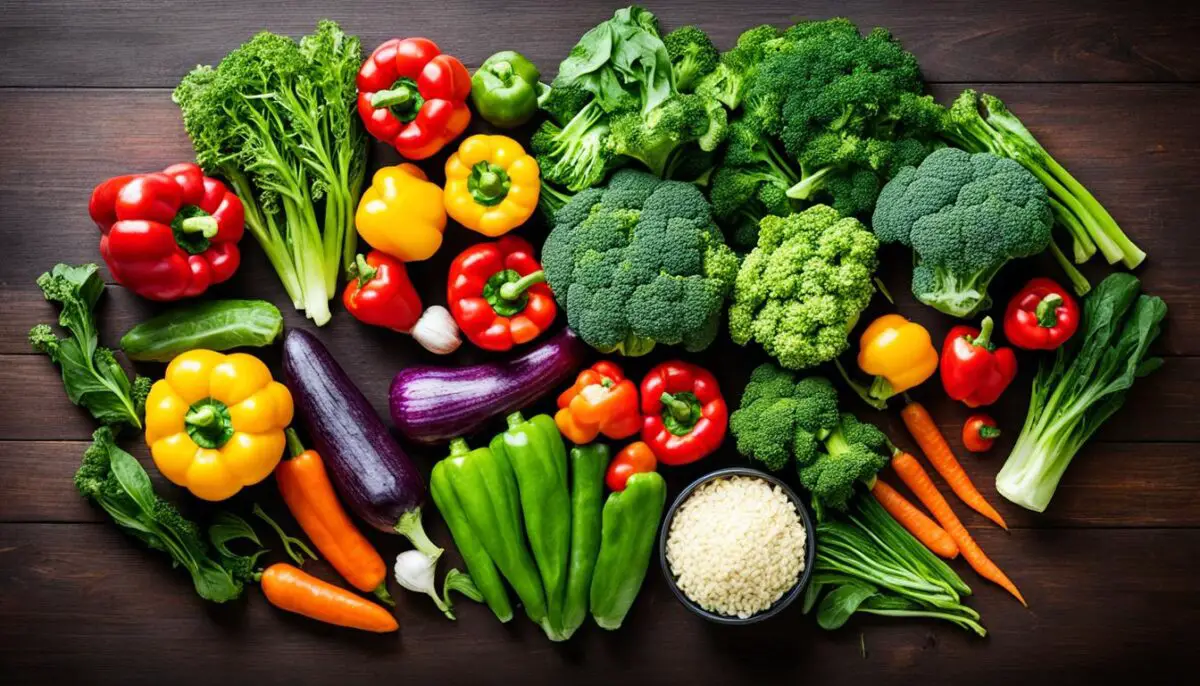
Preference vs Necessity: Do Rabbits Love Carrots?
Many people assume that rabbits have an inherent love for carrots, thanks to the popular image of Bugs Bunny joyfully chomping on a carrot. While it is true that some rabbits may show enthusiasm for carrots, their preference for this treat does not necessarily align with their nutritional needs.
Carrots can indeed be a source of enjoyment for rabbits due to their sweet taste. However, it is crucial to remember that a rabbit’s dietary preferences should not be the sole basis for their nutrition. Rabbits require a well-balanced diet that includes a variety of foods to support their overall health and well-being.
Feeding rabbits too many carrots can have negative health effects. Carrots, though rich in fiber, calcium, and Vitamin A, are also high in sugar. Excessive consumption of carrots can lead to weight gain, digestive issues, and dental problems in rabbits.
Therefore, it is essential to feed rabbits carrots in moderation as an occasional treat, rather than as a primary dietary component. The focus should be on providing a well-rounded diet that emphasizes high-quality hay and appropriate leafy greens.
To highlight the potential health risks of excessive carrot consumption for rabbits, let’s take a look at some of the possible effects:
1. Weight Gain
Rabbits that consume an excessive amount of carrots may experience weight gain. Carrots, although low in calories compared to other treats, can still contribute to an imbalance in a rabbit’s diet if consumed in large quantities. This can lead to obesity, which in turn can increase the risk of other health issues.
2. Digestive Issues
The high sugar content in carrots can disrupt a rabbit’s delicate digestive system. Too much sugar can upset the balance of beneficial bacteria in the rabbit’s gut, potentially leading to gastrointestinal problems such as diarrhea and bloating.
3. Dental Problems
Rabbits’ teeth have evolved to chew on fibrous materials such as grass and hay. Unlike these foods, carrots are relatively soft and can contribute to dental issues in rabbits. Chewing on crunchy hay helps wear down a rabbit’s constantly growing teeth, preventing dental overgrowth and related complications.
It’s important to note that while rabbits can enjoy the taste of carrots, they should not be relied upon as the primary source of nutrition. A rabbit’s diet should revolve around high-quality hay, which provides essential fiber for proper digestion, and appropriate leafy greens that offer vital nutrients to support overall health.
Table:
| Pros of Carrots for Rabbits | Cons of Excessive Carrot Consumption |
|---|---|
| – Carrots contain fiber, calcium, and Vitamin A. | – High sugar content can lead to weight gain. |
| – Some rabbits enjoy the taste of carrots. | – Excessive carrots can cause digestive issues. |
| – Carrots can be used as occasional treats. | – Soft texture can contribute to dental problems. |
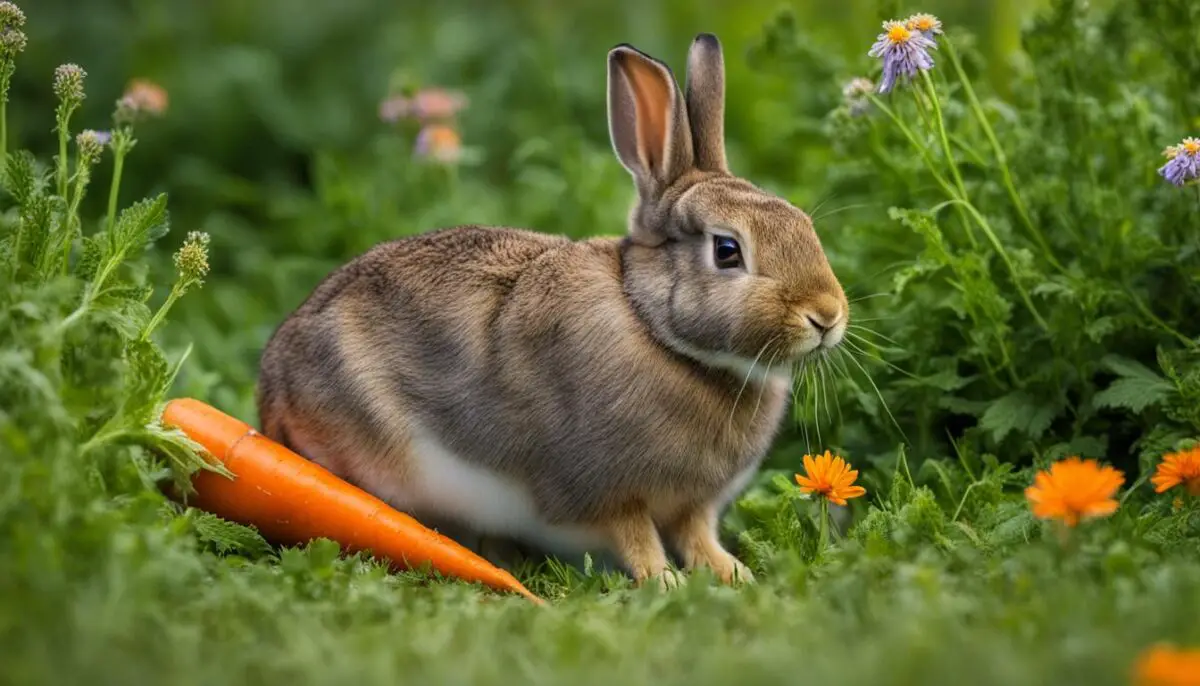
In summary, while rabbits may love the taste of carrots, their nutritional preferences should take a backseat to their overall well-being. Carrots should be given to rabbits in moderation as treats, along with a balanced diet that focuses on high-quality hay and appropriate leafy greens. By prioritizing a rabbit’s dietary needs, we can ensure their health and happiness for years to come.
Balancing the Rabbit Diet
When it comes to the well-being of rabbits, a balanced diet is essential. Providing the right combination of foods ensures that your furry friend receives the necessary nutrients to stay healthy and happy. In this section, we will explore the key components of a balanced rabbit diet, including the importance of high-fiber hay, the benefits of leafy greens, and the occasional indulgence of carrots as treats.
The Role of High-Fiber Hay
Hay is the cornerstone of a rabbit’s diet. It provides essential fiber that aids in digestion and helps maintain healthy teeth. Rabbits should have access to unlimited hay to mimic their natural grazing behavior. The long strands of hay promote dental wear and prevent dental issues that can arise from overgrown teeth.
Introducing Leafy Greens
Leafy greens are another crucial component of a rabbit’s diet. They offer a variety of vitamins and minerals that contribute to overall well-being. However, it’s important to introduce leafy greens gradually to avoid digestive upset. Start with small portions and observe your rabbit’s response before increasing the amount. Some recommended leafy greens include kale, spinach, and parsley.
| High-Fiber Hay | Leafy Greens | Carrot Treats |
|---|---|---|
| Provides essential fiber for digestion and dental health | Offers a range of vitamins and minerals | Occasional indulgence as a treat |
| Supports natural grazing behavior | Introduce gradually to avoid digestive upset | Avoid excessive consumption due to high sugar content |
| Helps prevent dental issues | Varied selection to provide a range of nutrients | Monitor intake to maintain a balanced diet |
Carrots as Occasional Treats
While carrots may be a favorite of many rabbits, they should only be given as occasional treats due to their high sugar content. Feeding rabbits too many carrots can lead to weight gain, digestive issues, and dental problems. Remember to monitor their carrot intake and prioritize a diverse range of vegetables to meet their nutritional needs.
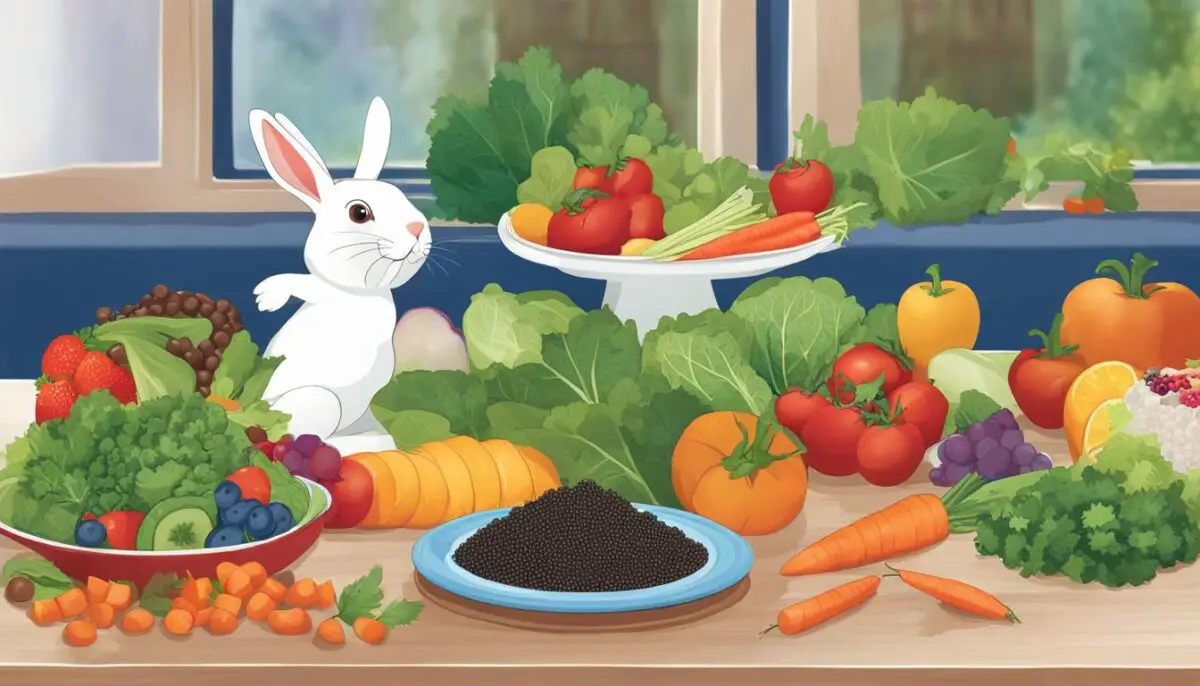
Carrot Nutrition and Rabbit Health Risks
Carrots are often seen as a healthy and nutritious food for humans, but when it comes to rabbits, there are some potential health risks associated with carrot consumption. While carrots do provide certain nutritional benefits, such as being a good source of Vitamin A, they also have a high sugar content that can have negative effects on a rabbit’s health.
Rabbits have sensitive digestive systems that are not well-equipped to handle high levels of sugar. Consuming excessive amounts of carrots can lead to weight gain, digestive upset, and even dental issues for rabbits. The high sugar content in carrots can contribute to tooth decay and other oral health problems in these adorable creatures.
It’s important to note that moderation is key when it comes to feeding carrots to rabbits. While they can be given as an occasional treat, they should not be a staple in their diet. Feeding rabbits a varied diet that includes a range of vegetables, in addition to hay and grass, is essential for their overall health and well-being.
| Nutritional Value of Carrots | Health Risks for Rabbits |
|---|---|
| High in Vitamin A | Weight gain |
| Good source of fiber | Digestive upset |
| Contain antioxidants | Dental issues |
While carrots do offer nutritional value, it’s crucial to be mindful of their high sugar content and potential health risks. It’s recommended to consult with a veterinarian or a rabbit nutritionist to establish a well-balanced diet that meets the specific needs of your pet rabbit.
Remember, a happy and healthy bunny is one that receives a varied diet, with carrots playing a minimal role to mitigate the potential risks associated with their consumption.
In the next section, we will delve deeper into the notion of balancing a rabbit’s diet to ensure optimal health and well-being.
Conclusion
In conclusion, it’s important to note that while rabbits may enjoy the taste of carrots, they should not be a main component of their diet. Carrots should be given in moderation as treats, alongside a well-balanced diet that includes high-fiber foods such as hay and appropriate leafy greens.
While carrots have nutritional value, they also have a high sugar content, which can lead to weight gain, digestive issues, and dental problems if consumed in excess. Therefore, it is crucial to prioritize meeting a rabbit’s nutritional needs rather than indulging their preferences for certain foods.
By understanding rabbit nutrition and providing a balanced diet, we can ensure that rabbits live healthy and vibrant lives. Focus on incorporating high-fiber foods like hay and appropriate leafy greens into their diet, while offering carrots as occasional treats. This approach will help maintain their overall health and well-being.
FAQ
Can rabbits eat carrots?
Yes, rabbits can eat carrots but in moderation. Carrots should be given as a treat and not as a staple in their diet.
What happens if rabbits eat too many carrots?
Feeding rabbits too many carrots can lead to weight gain, digestive issues, and dental problems due to the high sugar content. Carrots should be given in limited amounts.
What should be the main part of a rabbit’s diet?
The main part of a rabbit’s diet should consist of high-fiber foods such as hay, grass, and leafy greens. These foods promote proper digestive health in rabbits.
Are there any risks associated with feeding rabbits carrots?
While carrots are generally safe for rabbits, it’s important to avoid overfeeding them. Carrots contain natural sugar which can lead to health issues if consumed excessively.
Can rabbits have other vegetables besides carrots?
Yes, rabbits can have a variety of vegetables in addition to carrots. Leafy greens like kale, lettuce, and spinach are good options, but remember to introduce new foods gradually.
How often can rabbits have carrots as a treat?
Carrots can be given to rabbits as an occasional treat, but they should not make up a significant portion of their diet. It’s important to maintain a balanced diet for their overall health.
Do rabbits naturally eat carrots in the wild?
No, rabbits in the wild do not naturally consume carrots. Their diet primarily consists of wild greens like grasses and clover.
What are the potential health risks of feeding rabbits too many carrots?
Feeding rabbits excessive amounts of carrots can lead to weight gain, digestive upset, and dental issues. It’s crucial to provide a balanced diet to maintain their well-being.
What is the nutritional value of carrots for rabbits?
Carrots contain fiber, calcium, and Vitamin A, which are beneficial for rabbits. However, the high sugar content should be taken into consideration when feeding carrots to rabbits.
Source Links
- https://www.washingtonpost.com/lifestyle/kidspost/think-you-know-what-bunnies-and-bears-eat-their-diets-may-surprise-you/2019/09/20/bac528ea-ce5d-11e9-87fa-8501a456c003_story.html
- https://www.cottontailclub.com/are-carrots-good-for-rabbits-debunking-myths/
- https://medium.com/@aqsa70225/do-rabbits-really-love-carrots-debunking-a-common-myth-67adc5488179


